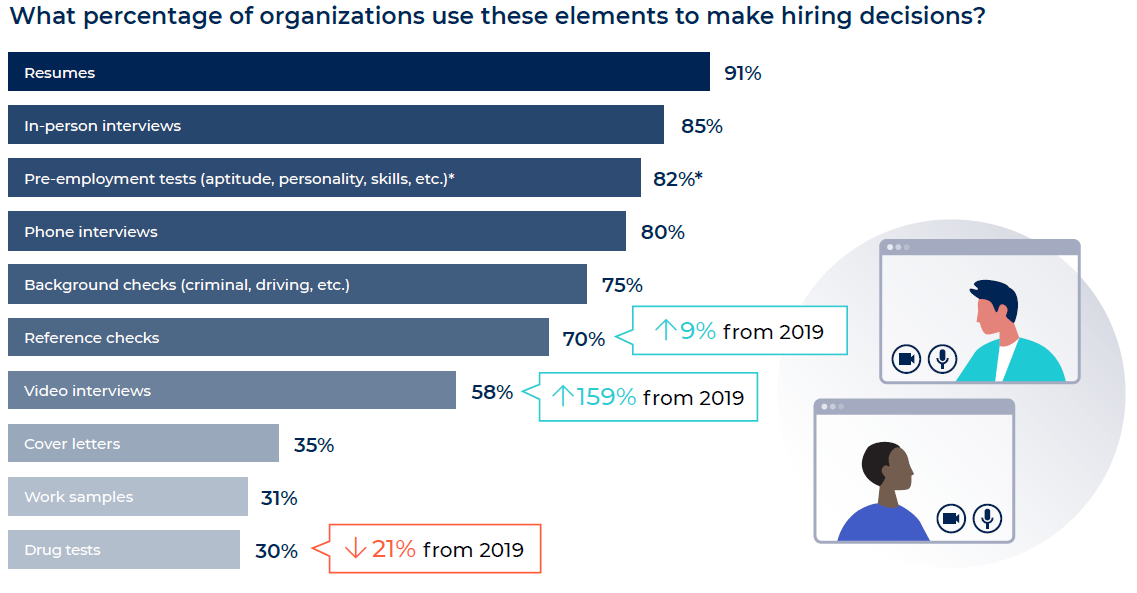We recently released our 2020 Hiring Benchmark Report based on a global survey of over 400 hiring professionals. In it, we uncovered some of the key changes that have come about as a result of COVID-19.
One of the biggest factors affecting organizations today is the rapid shift to remote work. 69% of our respondents said that they transitioned to remote work in some capacity as a result of the pandemic. Remote work necessitates remote hiring. And with it comes the need to screen candidates without ever meeting face to face.
This year, we asked hiring professionals which elements they include in their hiring process, and this is what we found:

Resumes and interviews claim the top of the list, as they do every year. 91% of hiring professionals are using resumes in their hiring process, and 85% are using in-person interviews. Both resumes and interviews have long been a core part of the traditional hiring process, and while they both have some flaws, few viable alternatives exist.
Below that, we see that 82% of organizations use pre-employment tests of some kind. While a large proportion of the survey respondents are Criteria customers and therefore use pre-employment tests, external data finds very similar numbers for the average usage of assessments.
Next, we see that 80% of hiring professionals are using phone interviews. Typically phone interviews are used as a pre-screener to the in-person interview, but this year they may have become a screener to a video interview – or even a replacement for an in-person interview. Meanwhile, 75% of hiring professionals are using background checks for their applicants.
We also see that 70% of hiring professionals are using reference checks this year. While reference checks are nothing new, one interesting thing to note is that reference check usage went up 9% from 2019, a significant jump when most of the other items on the list remained relatively stable year-over-year.
So why would reference checks, of all things, increase this year? One theory is that employers are simply looking for another way to double-check that the person they are about to hire is right for the job. With the uncertainties caused by remote hiring, employers may be looking for an extra checkpoint to confirm their hiring decisions. Plus, unlike background checks, reference checks are free - a big plus when times are tough.
But the increase in reference check usage was not nearly the biggest change this year. That honor goes to video interviews, and it’s really no surprise. This year, 58% of respondents say they’re using video interviews, a jump of 159% from last year, when that number was around 22%. Organizations are adapting to a new era of remote work by adopting video interviewing technology, and while it isn’t a replacement for in-person interaction, it certainly seems to fulfill a need that phone interviews simply cannot achieve. After COVID-19 finally fades from our lives, it will be particularly interesting to see if video interview usage goes down, or if it maintains this new level.
We also saw that cover letters are being used by 35% of hiring professionals, while work samples are being used by 31%.
And finally, we see that 30% are using drug tests. What’s interesting to note about this stat is that it has gone down by 21% from 2019. This is likely due to a lack of availability for in-person testing at clinics or facilities.
COVID-19 has clearly changed the way organizations hire this year. But will the changes stick around for next year? You’ll have to wait for our 2021 report to find out.
Until then, download your copy of the 2020 Hiring Benchmark Report for more insights into HR and hiring in 2020.





